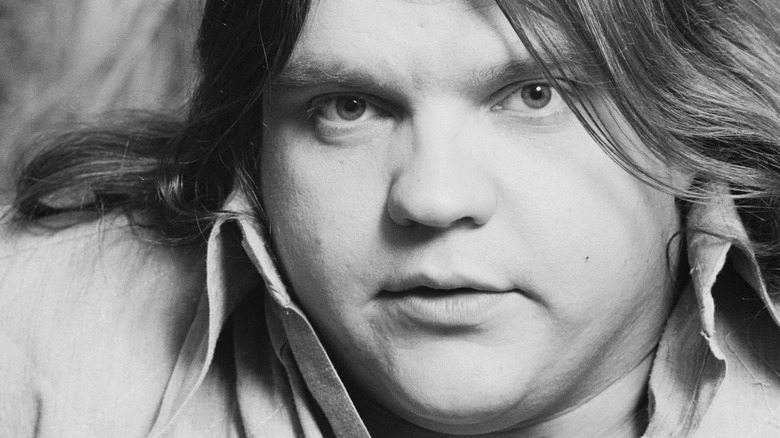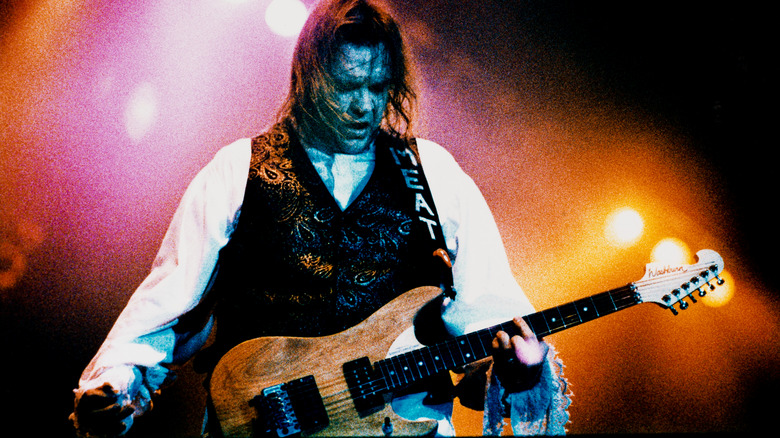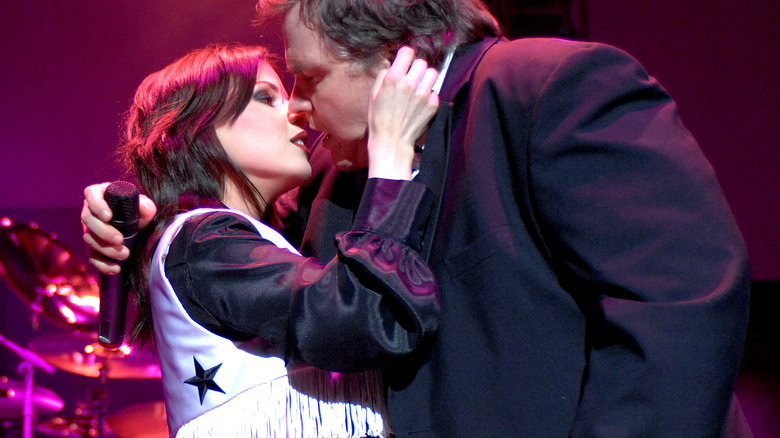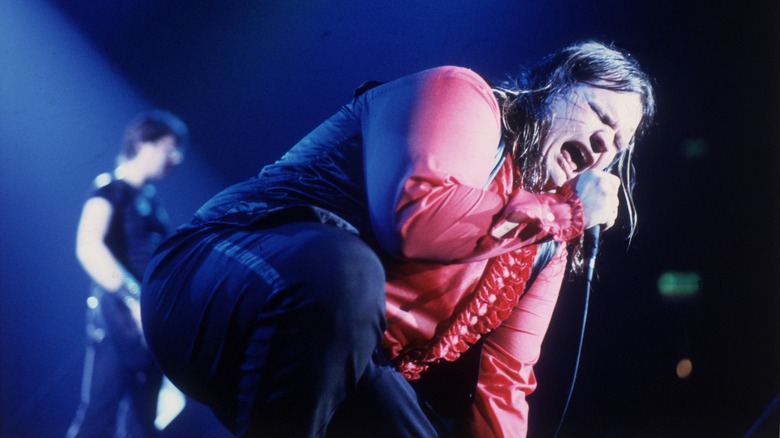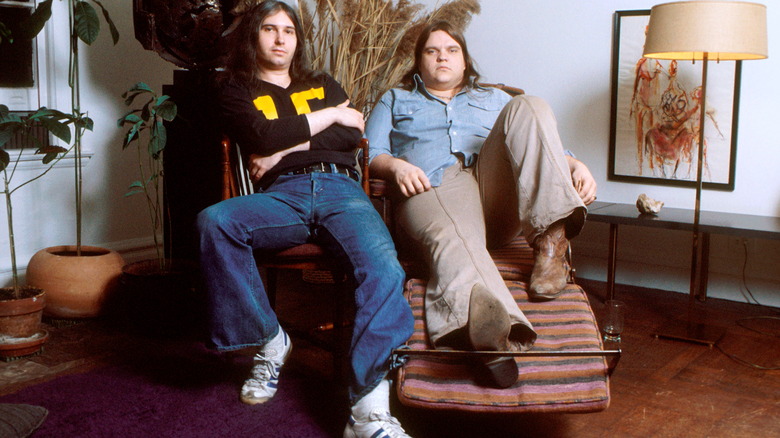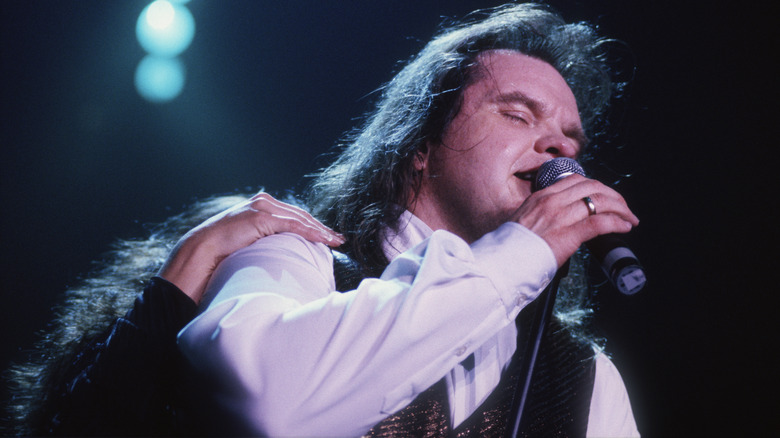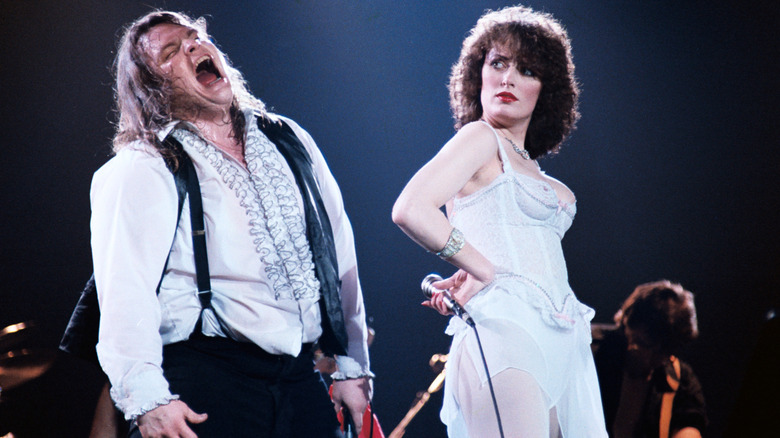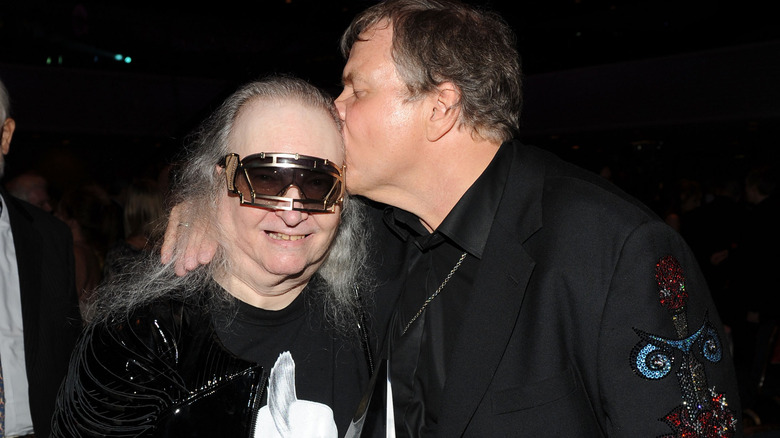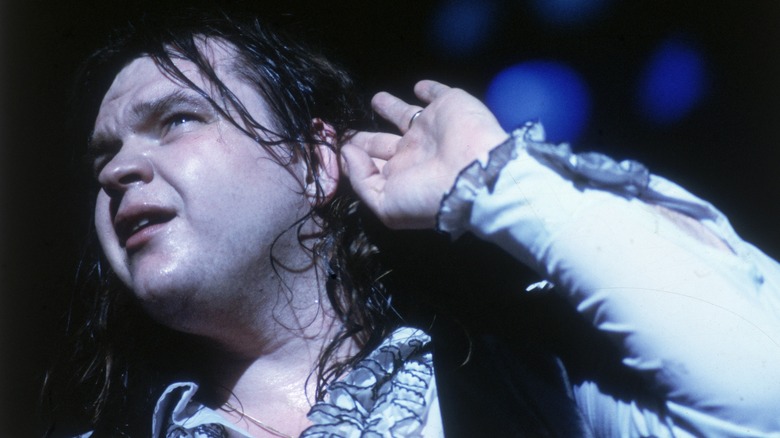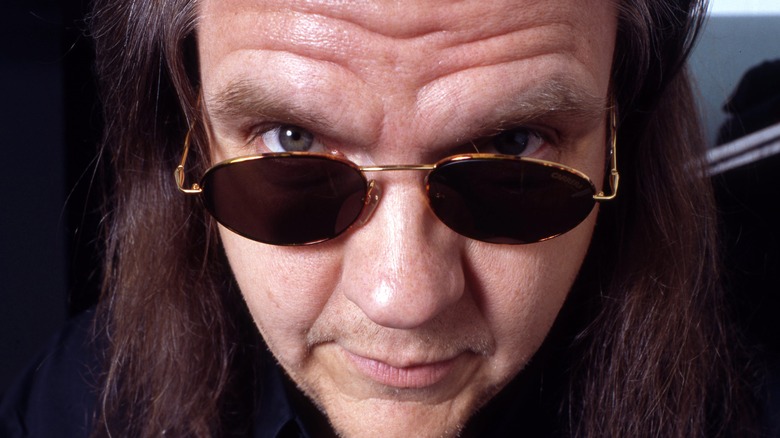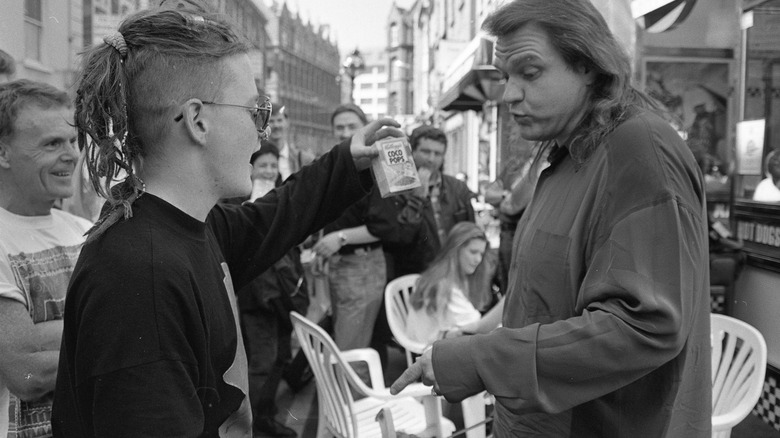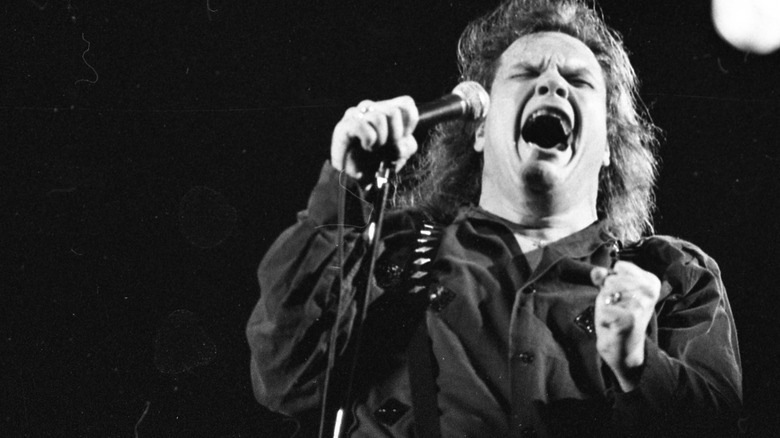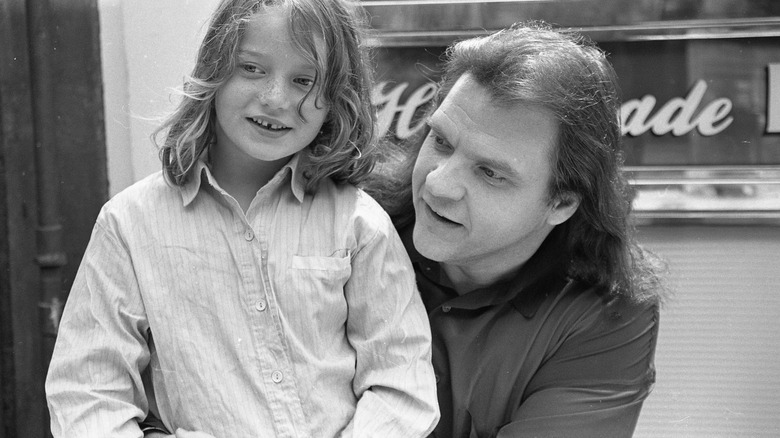The Untold Truth Of Meat Loaf
It didn't take long for 2022 to show that it was going to be pretty relentless when it came to taking away beloved celebrities, and the first month wasn't even over when it was announced that another had gone: Meat Loaf. Confirmation of his death came when his family posted on Facebook, says the BBC, and tributes rolled in from everyone from Bonnie Tyler to Brian May and Alice Cooper. (May wrote: "Always full of madness, with the innocent sense of naughtiness of a five-year-old, Meat was forever young," while Andrew Lloyd Weber proclaimed that "The vaults of heaven will be ringing with rock.")
The cause of his death wasn't immediately released, but it wasn't long before news outlets were reporting that the 74-year-old rocker had succumbed to COVID. According to The Telegraph, Meat had previously had a lot to say about COVID, and those he called "power-mad" and "Nazis." He was quoted as saying, "If I die, I die, but I'm not going to be controlled."
Meat Loaf left behind his wife, two daughters, and legions of fans — proving that the old adage about how someone should never give up on their dreams is absolutely true. At the time of his death, "Bat Out Of Hell" was, says Slate, the fourth best-selling album in the world. Given that it was initially rejected by multiple record labels and the session musicians who played on it thought it was a joke album ... that's not too shabby for a life's legacy.
His childhood was horrific
Meat Loaf was 70 years old in 2018, and when he sat down to talk to Rolling Stone, he was already struggling under the weight of countless health problems, used a walker to get around, and needed the help of his wife for the most basic of tasks. Still, they found the same fire was in his soul, and it particularly came out when he talked about his childhood. Always a heavy kid, he recounted how he weighed 240 pounds by the time he was in seventh grade. "Oh, man, I was tormented," he recalled.
Homelife wasn't much better. His father was — in addition to being "a salesman who could sell four tires to a man with no car" — an angry alcoholic. His mother — who tried her best to hold things together — died of cancer in 1966. (How old he was at the time varies: Meat has, says The Guardian, variously claimed he was born in 1947 and in 1951.) It wasn't long after his mother's funeral that his father burst into his room in a drunken rage, wielding a butcher knife and demanding to know the truth about all the girls the teenage Meat had in his room. (There were none.)
Meat recalled: "I rolled off the bed just as he put that knife right in the mattress. I fought for my life ... and left the house barefoot, in a pair of gym shorts and a t-shirt." He never returned.
Marvin, Michael, or Meat?
Everyone knows him as Meat Loaf, but he was born Marvin Aday. The story of his name is actually sort of a complicated one, and he's been known just as "Meat" for a long, long time. He told Rolling Stone that he got the name when he was just 4 days old. It was a gift from his father, who — upon seeing his newborn son — remarked, "He looks like meat." Flattering, it was not, but the name stuck.
Lots of people take stage names and keep their birth names, but Meat got rid of "Marvin" as soon as he could. According to The Guardian, he had it legally changed to Michael. Why? Because of a commercial that had left a lifelong scar.
Meat said that it was a Levi's commercial that featured a child who was overweight, just like him. It lamented, "Poor, fat Marvin can't wear Levi's," and hearing it had brought him to tears. Being an overweight child was what shaped him, he wrote in his autobiography, recalling that he had been too fat to play with the others and consequently spent most of his time alone. While getting used to finding his own entertainment meant that he got good at not being bored, even decades later, it still hurt: "... mothers wouldn't let their kids play with me."
Meat Loaf said his singing ability came from a weird accident
Meat Loaf had an impressive three-and-a-half octave vocal range, but what does that mean? According to School of Rock, most men have a range of one-and-a-half to two octaves. Freddie Mercury could hit four, and at the top? Axl Rose, with a whopping six-octave range. Still, Meat Loaf's range was amazing, and it stayed as he got older. In a 2016 interview with People, he noted that he was still singing in the same key that he was when he was in his 20s, but he was also fond of saying that he hadn't always been a singer.
It was quite the opposite, in fact: He told Rolling Stone that his mother — who was a gospel singer — was weirdly fond of telling him, "Good thing you're not going to be a singer, because you can't carry a tune in a bucket." What happened? According to him, he was a sophomore in high school when he was out on the track field and was hit by a 12-pound shot put. Once he recovered from the initial impact of the blow to his head, he discovered he had walked away from the accident with his impressive vocal range.
Over the course of his life, he was hit with everything from that shot put to whiskey bottles, and in 2018, he noted that he'd had 18 concussions: "And nothing, nothing has ever put me down. Yeah, man, I never go down."
Struggles with depression took away his voice
It was early on in his career that Meat Loaf met Jim Steinman (left), and Meat's biggest album — "Bat Out Of Hell" — was famously born from that union. It was never an easy partnership, but it hit a major low in the late 1970s. "Bat" was released in 1977, but it wasn't until 1978 that it really took off. Not one to rest on their laurels, a sequel was in the works almost immediately ... but as Meat explained to Rolling Stone, it started with Steinman heading off to work on it not with him, but with keyboardist Roy Bittan.
Meat was devastated: "When I found out, I thought I was going to kill myself, and I think I had already tried ... I basically had a nervous breakdown." And that included a complete loss of his voice. Steinman described him as sounding like "the little girl in 'The Exorcist,'" and it took months of therapy for Meat to regain his ability to sing.
They were very long months. The split with Steinman wasn't an amicable one, and Meat found himself drowning in debt as they hurled lawsuits at each other. According to People, it got so bad that he declared bankruptcy. He spent much of the early part of the decade at home with his wife and daughters. It ended up being a healing time: "I was much happier taking a Little League team to 10-0 than I was selling 10 million albums."
What's true? Who knows!
There's a story about how Meat Loaf happened to be front and center at JFK's assassination, only to have his car get commandeered by the secret service. Marie Claire says there's also his claims that he met Sarah Ferguson at a charity event, only to get into a bit of a scuffle with her new husband, Prince Andrew. The Queen, apparently, was not impressed. That was just the tip of the iceberg, with other stories claiming equally wild things, like he had once picked up a hitchhiker — and realized much, much later that it had been Charles Manson.
So, did any or all of this stuff happen? Here's the thing: It's pretty impossible to tell. Meat sat down to talk to the New York Post in 1999, and they called him out on some of the discrepancies among the stories he'd told. They started with his birth year, sometimes given as 1947, occasionally cited as 1951. Meat explained: "I might have lied about it at some point. ... The facts could hurt a good story, and I'm a believer in the PT Barnum philosophy: 'Don't care what you say about me, just spell the name right.'"
Also not true, according to that interview? The story about how "Meat Loaf" was the name given to him by his high school football coach, and the one about letting a car drive over his head. "I can't believe people believed all the crap I said."
Meat Loaf believed he had ghostly groupies
Everyone has their own opinions about what happens after death, and according to what Meat Loaf once told Shortlist, he knew there was something. It wasn't just "lights-out," and he knew that because he'd once had an encounter that made him a believer.
They were in the process of making "Bat Out Of Hell," he said, when he happened to look up, and saw a blonde girl in a white dress standing on the balcony above them. There shouldn't have been anyone there, and when Meat told the others, they went looking for her. Stepping out onto the same balcony, there was no one there.
Asked about his many accidents and concussions, he said that while he never had his life flash before his eyes, "I believe there's something when you die, because there are ghosts. I've seen them, I've been around them. Some are just energy left behind, and some are intelligent. I've had conversations with them."
He had severe asthma
It might seem almost unthinkable that a rocker who relies not only on his voice, but his operatic, multi-octave voice also had asthma, but he did — and because of it, Meat Loaf kept oxygen tanks close at hand. In a 2016 interview, he said that inhalers just didn't cut it for him — he needed oxygen tanks. He explained: "When you go on, and you hit that zone, and you're in that energy, you're going to want to come off-stage and have that oxygen."
It was absolutely nothing new, either. According to what he said way back in 2011 (via The Sydney Morning Herald), he'd been carrying oxygen masks and tanks around since 1967. And that's in addition to the asthma spray, and while it might seem like that's kind of a big deal, he was used to it — and so was the crew and the band. "It's like I'll get some sort of asthma attack at every show, so it's not that big of a deal," he explained. "I mean, the band sees me and they don't ever pay attention to it, they just walk past."
Still, The Wall Street Journal suggests that maybe it was a big deal, after all, saying that it led to several on-stage collapses.
Meat Loaf and Jim Steinman
When Jim Steinman died in 2021, Rolling Stone called Meat for an interview. He immediately broke down in tears. He explained: "Since I met Jim, he has been the centerpiece to my life. And I was always the centerpiece of his. ... And I didn't care. I wanted that."
Meat said that it had taken some convincing to get Steinman on board with the partnership, and it wasn't always easy. At first, record labels would want one or the other, but according to Meat, they always stuck together. "... me and him together, we're an unstoppable force," he said.
Not all the stories are great, though: When Steinman and Meat temporarily went their separate ways after "Bat," Meat's depression — amid a whopping $80 million in lawsuits — led to a massive weight loss. The two reconciled for "Bat 2," but according to Rolling Stone, Steinman was so mad he was going to ruin the image that he'd built that he stocked the studio with dozens of donuts in hopes of getting him to put the weight back on. At the same time, says The Guardian, he had given Meat strict orders to sing, and never talk on stage. Why? "When he speaks," Steinman was quoted as saying, "the audience suddenly sees he's just the fat kid who works at the gas station." Those who knew them often described Steinman as Frankenstein and Meat as his monster.
What wouldn't he do for love?
One of Meat Loaf's biggest songs is "I'd Do Anything For Love (But I Won't Do That)." Unsurprisingly, there have been a lot of questions about what "that" refers to, and he's explained it a handful of times. He's said: "It's the line before every chorus. There's nine of them, I think. The problem lies because Jimmy likes to write, so you forget what the line was before you get to 'I won't do that.'"
That includes things like "forget the way you feel right now," and "lie to you," but what about the real-life Meat Loaf, the one that exists outside of the lyrics? Ali Wentworth asked him (via Yahoo) just what he would — and wouldn't — do for love.
He would, for example, become vegan for love, saying that he didn't actually mind vegan food. He'd also record a song with Justin Bieber, although he added that Bieber might not actually like the deal, because "it would come with a really good lecture." And how about taking a bullet? "For my wife, yeah."
Meat Loaf didn't just star in Fight Club...
Meat Loaf has an impressive 108 acting credits to his name, but the most famous will always be "The Rocky Horror Picture Show" and "Fight Club." Meat told the New York Post that "Fight Club" was one of the most challenging movies he'd been in, because David Fincher had a very specific vision for his character. He got it, he revealed, by filling in the details of Bob's history and answering the question: "Who the hell was this guy, and how many bridges did he burn when he was on steroids?"
He said later that he actually did much more than just appear on-screen in "Fight Club," and he had helped edit the film, too. According to Variety, Meat said that Fincher often called him into his trailer while he was editing, and asked him to help pick which takes would make it into the final cut. "I sat next to David the entire time," he said, then clarified: "Well, not next to him — I would have driven him crazy — but close, like behind him, so I could see what was going on and what he was seeing."
Once he piped up with an opinion, Meat said, Fincher asked him to do it again and again. Given that they had an average of 44 takes for each piece of the film, it's safe to say that it was a lot to watch.
His thank-yous were real
By Meat Loaf's own admission, there was a lot he said that just wasn't true — and that's what makes a particularly heartfelt moment in a 1999 interview with the New York Post so poignant.
Writer Dan Aquilante had reviewed one of his concerts before, and he hadn't been kind. Meat had called him up after the review ran, and unloaded on in him a 20-minute, expletive-filled rant. When they spoke again, Aquilante asked if he remembered the rant and the negative review. Meat clarified why he was mad, and it wasn't about the review. He said that if he didn't like the show, that was one thing — not everyone likes the same things, after all, and Meat said, "I've almost never complained about what writers say."
He had called, though, for something else: "I said 'thank you' to the audience, and you didn't see it as a real moment." It wasn't like most shows, Meat said, where the performers thanked the city, waves, and moved on to the next. For him, it was earnest — and the suggestion that it was anything but was what got him angry enough to track Aquilante down. Meat explained: "There wasn't a night I didn't mean it. I thanked the fans every night for over 200 shows of the tour. You ... made comments on that, and I called. ... I felt you had been jaded, and I had to set you straight."
Meat Loaf likened his singing ability to mental illness
When Meat Loaf was just getting started, he got offered a huge opportunity. According to The Guardian, he had been doing Shakespeare in the Park when he was offered $60,000 a year for five years of training as an opera singer, and that was followed by a gig at the Met. He turned it down, because "There's no improv, there's no freedom, there's no, you know, soaring. You can't go off in the clouds and just escape. So ... I couldn't do that."
There's a little more to it, too. Meat Loaf has explained that he "can't sing unless there's a character," and what he meant by that was a little complicated. "Because I don't sing," he explained. "It's almost like being schizophrenic — I don't sing, the character sings. And if I'm not in touch with my characters on any given night — sort of like channeling — I can't sing."
Getting in touch with those characters meant an extensive, pre-concert set of rituals he'd go through, and he spoke a bit about who some of those characters were. He told Rolling Stone that the person actually singing "Anything For Love" was a 15-year-old boy, and it was the same person that came back to sing on "Bat 2" — 16 years later. And in "Hang Cool Teddy Bear," he's actually a soldier named Patrick. He told The Scotsman: "I gotta sing it. But not as myself. That's why I had to become Patrick."
He never wanted to be a rock star
While it might be impossible to envision Meat Loaf-free music, it almost didn't happen: According to what he told Rolling Stone, he never had any intentions of making a living with his voice.
At first, his dream had been to play professional football. That didn't pan out, and it still wasn't his next choice. He told Shortlist that he had then set his sights on being an actor — and while he was a surprisingly prolific actor, that hadn't gone according to plan, either. Cast as Billy Bibbit in "One Flew Over The Cuckoo's Nest" — a role that would ultimately go to Brad Dourif — what might have been his big break fell through thanks to a writers' strike. He went on to "Rocky Horror" instead, and "had the time of my life in London."
Still, what he really wanted? "When people call me a legend, I say, 'Don't call me that, I'm not a legend.' I don't pretend to be one. I want to be just a normal human being." And that tracks with what he once told People, saying that his time away from the stage was among the happiest times of his life, He was grateful, though, for the touring: "I'm unbelievably happy. I have my kids ... plus, I get paid pretty well for my work."
Meat Loaf's recipe for fixing the world
When Meat Loaf talked to Rolling Stone in 2018, he had a lot to gripe about — including a long struggle to recover from back surgery. He complained, too: "Those Facebook people, man, you know, yeah, I get upset." And he was always right there to say it, too, calling out the trolls left and right. Meat, it turned out, had been thinking there was a lot wrong with the world for some time.
In 2012, he had talked to Esquire about exactly that. He had just released the album "Hell in a Handbasket," and explained: "For the last six or seven years, I've been saying the world has gone to hell in a handbasket." He cited a slew of reasons why he thought the world was falling apart, but it wasn't the wars, the large-scale conflicts, or the ever-lurking presence of nuclear weapons that he was really talking about. He was talking about "the humanity and the compassion of the world," which he saw as being sorely lacking. That, coupled with the fact that "people don't pay attention," and didn't bother learning about their own history, made things pretty dire in Meat Loaf's book.
He did, however, have a solution. "There's a song, 'Our Love and Our Souls," and I think those are really the things people need to return to. ... 'Nothing lasts forever but our love and our souls.' That's what people need to think about."
